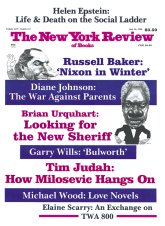In response to:
Is God in the Lab? from the May 28, 1998 issue
To the Editors:
It is symptomatic of the unlevel playing field on which science and religion contend today that a scientist with no theological credentials (Freeman Dyson, in The New York Review, May 28) feels comfortable in concluding that the theology of a fellow scientist (John Polkinghorne) is, like all theology, about words and not, as is the case in science, about things. This is in the face of the fact that virtually all theology takes God to be the only completely real “thing” there is, all else being like shadows in Plato’s cave. Muslims in their testament of faith sometimes transpose “There is no God but the God” to read “There is no Reality but the Reality,” the two assertions being identical.
As for Dyson’s claim that “there is nothing analogous to theology in Judaism or in Islam,” it fits poorly in both cases. In Judaism, I pass over Philo of Alexandria to mention that while I was a student at the University of Chicago, Robert Maynard Hutchins and Mortimer Adler were putting together their list of the hundred great books that was to evolve into the Great Books Program. An early entry on their list (which they were team teaching in Great Books discussion format when I got wind of the project) was The Guide to the Perplexed by the world-class Jewish philosopher-theologian Moses Maimonides. In Islam’s case, it appears to have slipped Dyson’s mind that it was the Muslims who kept Greek philosophy alive during Christendom’s dark ages, and that when Thomas Aquinas (through their legacy) came upon Aristotle’s Metaphysics, he found its challenge to Christian theology sufficient to cause him to write his Summa Theologica to baptize Aristotle and effect the medieval synthesis. When he went on to write his companion summa, the Summa contra Gentiles, Muslims were the gentiles it was aimed at. He found their philosophical theology so formidable that he felt it imperative that Christendom face up to it, and Avicenna (Ibn Sina) and Averroes (Ibn Roshd) continue to figure in standard histories of Western philosophy. As for “Hinduism and Buddhism…hav[ing] no theology,” as Dyson’s Cook’s tour continues, one can only marvel that his informants seem to have overlooked Shankara, Nagarjuna, and the Abhidharma. No one who has ever cracked the last of these—dauntingly scholastic, and one of the three “baskets” of original Buddhist texts—would dream of characterizing it as “poetic rather than analytical.”
The wrong foot that the above misunderstandings cause Dyson to step forth on leads him to conclude that “conflicts between science and Christianity…do not exist between science and other religions.” Again the truth of the matter comes to me in an autobiographical recollection, this one from the years I taught at MIT. A visitor from abroad had written ahead to ask the Institute’s visitors’ bureau to schedule an appointment with me. He turned out to be the vice-chancellor of the leading technological institute in Egypt, and the title of one of my courses was the only place in the MIT catalog where he found that “religion” appeared. This lead him to seek my counsel on what he considered to be a serious problem in his country. “All of our students come to us as believing Muslims,” he reported, “and most of them graduate as atheists or agnostics.” Much of Islamic fundamentalism today derives from the fact that in Middle Eastern Islamic countries 80 percent of the population continues to adhere to the traditional world view of the Koran while being ruled by the elite 20 percent who have been educated in Europe and America and have largely adopted their outlooks, including the scientific world view.
When Freeman Dyson engages in haute vulgarisation—the art of translating difficult (in his case scientific) ideas into layman’s vernacular with style—he turns into a hero of mine whose writings I try never to miss.
Huston Smith
Berkeley, California
Freeman Dyson replies:
I am grateful to Huston Smith for correcting my mistakes. I have, as he says, no theological credentials. I have learned a lot from his letter. My statement that Judaism and Islam have nothing analogous to theology was based on casual conversations with Orthodox Jews and Muslims among my acquaintances. In particular, the great physicist Abdus Salam, who was a devout Muslim with a strong interest in the history of Islam, said that Islam has no theology. Rabbi Bloom, a British rabbi who writes popular books about Judaism and appears frequently on BBC television, said that Judaism has no theology. These statements were made about Judaism and Islam as experienced by ordinary believers in modern Western communities. Huston Smith is speaking about Judaism and Islam as seen by a scholar with expert knowledge of their ancient literatures. Therefore I venture to claim that Huston Smith and my informants are both speaking the truth. A deep truth, as defined by the physicist Niels Bohr, is a true statement whose opposite is also true.
This Issue
July 16, 1998



